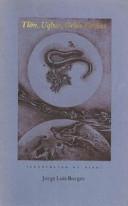Quotes from book
Tlön, Uqbar, Orbis Tertius

"Tlön, Uqbar, Orbis Tertius" is a short story by the 20th-century Argentine writer Jorge Luis Borges. The story was first published in the Argentine journal Sur, May 1940. The "postscript" dated 1947 is intended to be anachronistic, set seven years in the future. The first English-language translation of the story was published in 1961.

Tlön, Uqbar, Orbis Tertius (1940)
Variant: Today, one of the churches of Tlön Platonically maintains that a certain pain, a certain greenish tint of yellow, a certain temperature, a certain sound, are the only reality. All men, in the vertiginous moment of coitus, are the same man. All men who repeat a line from Shakespeare are William Shakespeare.

“I owe the discovery of Uqbar to the conjunction of a mirror and an encyclopedia.”
First lines
Tlön, Uqbar, Orbis Tertius (1940)

“In life, he suffered from a sense of unreality, as do many Englishmen.”
Tlön, Uqbar, Orbis Tertius (1940)
Variant: In his lifetime, he suffered from unreality, as do so many Englishmen; once dead, he is not even the ghost he was then.

Tlön, Uqbar, Orbis Tertius (1940)
Context: Who are the inventors of Tlön? The plural is inevitable, because the hypothesis of a lone inventor — an infinite Leibniz laboring away darkly and modestly — has been unanimously discounted. It is conjectured that this brave new world is the work of a secret society of astronomers, biologists, engineers, metaphysicians, poets, chemists, algebraists, moralists, painters, geometers... directed by an obscure man of genius. Individuals mastering these diverse disciplines are abundant, but not so those capable of inventiveness and less so those capable of subordinating that inventiveness to a rigorous and systematic plan. This plan is so vast that each writer's contribution is infinitesimal. At first it was believed that Tlön was a mere chaos, and irresponsible license of the imagination; now it is known that it is a cosmos and that the intimate laws which govern it have been formulated, at least provisionally. Let it suffice for me to recall that the apparent contradictions of the Eleventh Volume are the fundamental basis for the proof that the other volumes exist, so lucid and exact is the order observed in it.

Tlön, Uqbar, Orbis Tertius (1940)
Context: Hume noted for all time that Berkeley's arguments did not admit the slightest refutation nor did they cause the slightest conviction. This dictum is entirely correct in its application to the earth, but entirely false in Tlön. The nations of this planet are congenitally idealist. Their language and the derivations of their language — religion, letters, metaphysics — all presuppose idealism. The world for them is not a concourse of objects in space; it is a heterogeneous series of independent acts. It is successive and temporal, not spatial.

Tlön, Uqbar, Orbis Tertius (1940)
Context: Hume noted for all time that Berkeley's arguments did not admit the slightest refutation nor did they cause the slightest conviction. This dictum is entirely correct in its application to the earth, but entirely false in Tlön. The nations of this planet are congenitally idealist. Their language and the derivations of their language — religion, letters, metaphysics — all presuppose idealism. The world for them is not a concourse of objects in space; it is a heterogeneous series of independent acts. It is successive and temporal, not spatial.

Variants: One of the schools in Tlön has reached the point of denying time. It reasons that the present is undefined, that the future has no other reality than as present hope, that past is no more than present memory . . . Another maintains that the universe is comparable to those code systems in which not all the symbols have meaning, and in which only that which happens every three hundredth night is true...
The history of the universe... is the handwriting produced by a minor god in order to communicate with a demon.
Tlön, Uqbar, Orbis Tertius (1940)
Context: One of the schools of Tlön goes so far as to negate time; it reasons that the present is indefinite, that the future has no reality other than as a present hope, that the past has no reality other than as a present memory. Another school declares that all time has already transpired and that our life is only the crepuscular and no doubt falsified an mutilated memory or reflection of an irrecoverable process. Another, that the history of the universe — and in it our lives and the most tenuous detail of our lives — is the scripture produced by a subordinate god in order to communicate with a demon. Another, that the universe is comparable to those cryptographs in which not all the symbols are valid and that only what happens every three hundred nights is true. Another, that while we sleep here, we are awake elsewhere and that in this way every man is two men.

Tlön, Uqbar, Orbis Tertius (1940)
Context: The metaphysicians of Tlön do not seek for the truth or even for verisimilitude, but rather for the astounding. They judge that metaphysics is a branch of fantastic literature. They know that a system is nothing more than the subordination of all aspects of the universe to any one such aspect. Even the phrase "all aspects" is rejectable, for it supposes the impossible addition of the present and of all past moments.